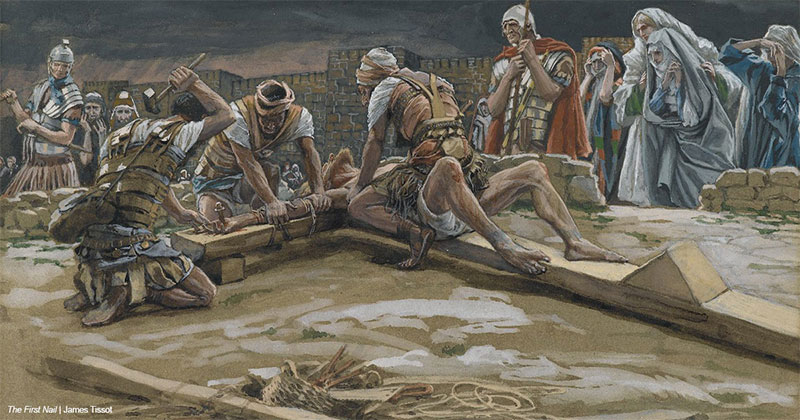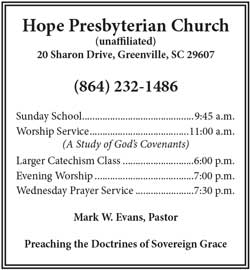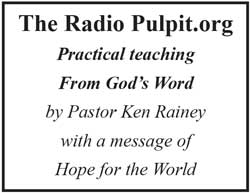
At first glance, Good Friday seems pretty bad. It’s fundamentally about a man being executed by one of the most excruciating methods human cruelty has devised. Adding insult to injury, before he died this man was betrayed, beaten, mocked, whipped, jeered, stripped, ridiculed, and slandered. And, to top it all off, the man who so suffered was innocent of any crime. What is good about that?
The grotesque, unsettling nature of this unjust execution has prompted at least one megachurch network of campuses to omit references to “Calvary” or the “blood of Jesus” from its Easter invitations to non-Christians who may attend — I would say, “Resurrection Sunday,” but they also avoid mentioning the resurrection.
Clearly, there’s a larger context to these objectively bad events that make them good, at least in a different sense. But, before resolving the tension, let’s first make it appear even stranger, through the lens of a recent passage from the Stand on the Word Bible reading plan (Numbers 21, from March 20).
Near the end of 40 years’ wandering in the wilderness, the people of Israel “became impatient” and “spoke against God and against Moses, ‘Why have you brought us up out of Egypt to die in the wilderness? For there is no food and no water, and we loathe this worthless food’” (Numbers 21:4-5). Such complaining was commonplace, but the ensuing sequence of events is unique — and more than a little bit weird.
“Then the Lord sent fiery serpents among the people, and they bit the people, so that many people of Israel died. And the people came to Moses and said, ‘We have sinned, for we have spoken against the Lord and against you. Pray to the Lord, that he take away the serpents from us.’ So Moses prayed for the people. And the Lord said to Moses, ‘Make a fiery serpent and set it on a pole, and everyone who is bitten, when he sees it, shall live.’ So Moses made a bronze serpent and set it on a pole. And if a serpent bit anyone, he would look at the bronze serpent and live” (Numbers 21:6-9).
God sent “fiery” serpents with fatal bites (perhaps they were poisonous) as a judgment on his grumbling people. The Israelites then repented; they confessed their sin and named it particularly. Yet God did not grant the relief they asked for — taking the serpents away. Instead, he authorized a new form of relief: looking on a bronze serpent set on a pole. What a strange prescription.
The doubtful might ask, “Really, God? What is that supposed to do? If I’m dying of snake venom, I don’t see what good a statue will be, and I certainly don’t want to look at any more snakes.” The nation of Israel certainly didn’t understand. Until the time of Hezekiah, they made offerings to Moses’s serpent as to an idol (2 Kings 18:4), apparently thinking the healing power was in the snake.
But the power was really in God’s word, “everyone who is bitten, when he sees it, shall live.” Those who had faith heard God’s Word and believed it. When they were bitten by serpents, they acted in faith and looked to the snake, and they lived.
As foreign and arcane as this may seem to American Christians in the 21st century, there is a direct New Testament application of this episode in John 3:14-15, where Jesus said, “And as Moses lifted up the serpent in the wilderness, so must the Son of Man be lifted up, that whoever believes in him may have eternal life.” The Son of Man is a Messianic name for Jesus, and he was lifted up on the cross.
In this parallel, we have the same role as the children of Israel, wandering in the wilderness of this world. We are afflicted not by fiery serpents but by the effects of the curse and by sin — our sin, and the sins of others. Our sin makes us gross and unlovely, unworthy of any favor from God. By our sin we profane God’s image in us and pervert his good design for mankind. We deserve both physical death and eternal death for our rebellion against God. But God has provided Jesus as a means of salvation for all who look to him in faith. On Good Friday, Jesus suffered everything we deserve.
For this blood atonement to stick, it must be laid over the theological primer coat found in the following verse, which is among the Bible’s most famous, “For God so loved the world, that he gave his only Son, that whoever believes in him should not perish but have eternal life” (John 3:16). This verse makes clear that the man who was crucified in our place was not only a man, but also the Son of God.
Why is that essential? Any regular man would be incapable of dying a substitutionary death because, born of Adam’s fallen race, he would have earned his own death penalty for his own sins. The only effectual sacrifice that could wash away our sins is a sinless one. No descendant of Adam is sinless, and the sacrifice of no lesser creature, like bulls or goats (Hebrews 10:4), can suffice. With no acceptable offering available by human agency, God himself provided the lamb to take away the sins of the world (Genesis 22:8, John 1:29).
Thus, we have the good, the bad, and the ugly of Good Friday.
The Bad: What wicked men did to Jesus was wicked, unjust, malicious, premeditated, inexcusable.
The Ugly: Yet Jesus’s suffering had to take place (Luke 9:22). They meant it for evil, but God meant it for good (Genesis 50:20). Not only did Jesus bear the reproach of the wicked, but he bore the full weight of God’s wrath against our sin. By the extent of Jesus’s grotesque suffering on Good Friday, we can measure the grotesque, vile, wretched nature of our sins, because “he was crushed for our iniquities” (Isaiah 53:5).
The Good: As a result, Jesus’s one-time, sinless, substitutionary sacrifice has perfectly satisfied the wrath of God, so that “there is therefore now no condemnation for those who are in Christ Jesus” (Romans 8:1). Jesus’s blood washes those who believe in him clean of the deepest, toughest, ugliest sin stains. Those who see no need for salvation may find all this talk of blood offensive, and they may revile this good news, just like they did our Lord. But, for those who know themselves to be desperate, no message could be sweeter.
Good Friday calls for sober reflection rather than superficial light-heartedness. Its goodness is costly, weighty, immeasurably precious, like every drop of blood shed by the Son of God. But its minor key plucks strings that otherwise remain unmoved in our hearts. As we await the glorious triumph of Resurrection Morning, our posture should be that of the closing verse to Johann Heermann’s hymn, “Ah, Holy Jesus, How Hast Thou Offended”: “Therefore, kind Jesus, since I cannot pay thee, I do adore thee, and will ever pray thee, think on thy pity and thy love unswerving, not my deserving.”
-----------------------------
Joshua Arnold is a senior writer at The Washington Stand.
For source of article click HERE.


















